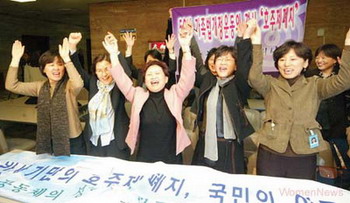On the heels of last year''s achievements, Korean women have come a long way for their empowerment this year. Some of their concerns and pending issue are as follows:-Ed.

Accordingly, the traditional Hoju System, which has been under fire as a patriarchal, gender discriminatory system since the enactment of the civil law in 1958, becomes a new status registration system on January 1, 2008. The current system, therefore, will remain in effect until the end of 2007. As a result, the government came up with legislations by the Ministry of Justice and the Supreme Court, while the civic groups organized a common action to enact purpose-specific status registry act.
A newborn baby will use the father's surname in principle, but he or she will be allowed to use the mother's surname when the parents agree as such, the revision said. When a child under the age of 15 is adopted, he or she will be listed in a family register as a real child, enabling the adoptee to have the same rights as a biological child.
Meanwhile, members of organizations which have long been supporting the abolition of the Confucian-inspired family registry system welcomed the Assembly decision, held a press conference and issued a statement. The Citizens' Solidarity for Abolition of the Hoju System, the Korea Legal Aid Center for Family Relations, the Korea Women's Associations United(KWAU) said in their statement, “The abolition of the system means a lot to us as it brings such values as democratic gender, gender equality and individual dignity and sets future directions in which our family and society should follow.”

